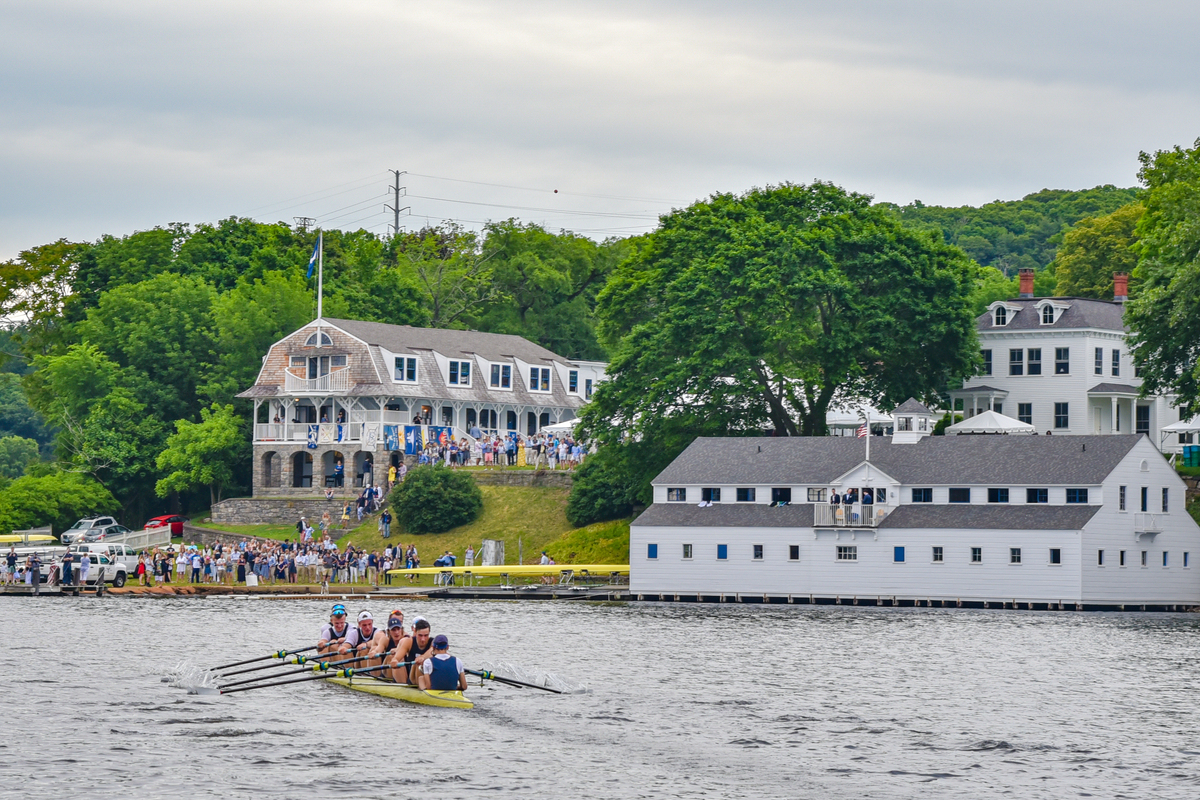Yale-Harvard Regatta returns after three-year hiatus
The Race returns for its 155th iteration after two consecutive cancelations due to the pandemic.

Courtesy of Joel Furtek '90
After a three-year hiatus, the Yale-Harvard Regatta is set to return on June 11 in New London, CT.
The Yale-Harvard Regatta, commonly known as The Race, is America’s oldest intercollegiate sporting event, dating back to 1852. The event has annually hosted Yale and Harvard men’s heavyweight crews since its founding, with exceptions such as major world wars and the COVID-19 pandemic. The last race was held on June 8, 2019, when Yale captured the Sexton Cup, the trophy awarded to the winning first varsity crew.
“It’s not any other race. It is unique, both in its history and its format,” men’s heavyweight head coach Steve Gladstone said. “There is no question. For a Yale and Harvard oarsman, it is the race of the year.”
The Race is held in early June, shortly after nationals. Following the end of classes, the rowers move out of their dorms and into Old Campus, where they remain until the completion of the Eastern Sprints and IRA Championships. The day after graduation, the rowers, coaches and a series of volunteers who maintain the house drive an hour to Gales Ferry Boathouse — the home of the heavyweight crew — in New London, CT where the event is held. The crew remains there for two to three weeks to train for and compete in The Race.
A significant factor that sets The Race apart from other events is its added length. Throughout the season, regular races are two kilometers long. The event includes three races: a two-mile race for the third varsity, three-miles for the second varsity and a four-mile race for the first varsity. Gladstone contextualized the difference in length by equating the regular two kilometer races to a sprint and the four-mile race to a marathon — a usual finish time for a two kilometer is less than six minutes but a four-mile can last up to twenty.
Vlad Saigau ’22, coxswain for the first varsity, added that during a two kilometer race there is no time to “play mind games.” The crew can only focus on getting to the finish line as quickly as possible. But in a longer race, each boat is focused on a fast start — putting in the level of effort comparable to that of a two kilometer early on. This level of exertion places a large physical and psychological toll on the crew.
“You are working a lot harder than you can sustain for twenty minutes,” Saigau noted. “Undoubtedly going to be the most painful race that any of these guys row this year. They are all aware of that.”
Aside from the difference in format, The Race is unique because of its rich history and the traditions that have surrounded the event for generations.
As the first American intercollegiate event, The Race has hosted generations of Yale and Harvard rowers, along with large “spectator fleets” throughout the years, according to Gladstone. While the crowd is not as large as it once was, he noted that yachts still line the side of the course to watch the event, along with the number of alumni who gather at Gales Ferry to follow the live-streamed race.
“When I talk to Yale rowing alumni, almost without question, [The Race] is the seminal experience of their Yale rowing career,” Gladstone told the News.
For the oarsmen, the circumstances surrounding the race provide added significance.
At Gales Ferry, the crew is isolated from the outside world throughout their stay — without any possible distractions or WiFi access. With the semester over, the team is left to focus solely on the upcoming races. Saigau noted that being there is like being in a “Yale bubble” where the compound is filled with pictures of past crews and the only thing to do aside from training is bonding. The experience is “meditative, in a way.”
“The semester is so fast paced and there is so much to do and all of a sudden it becomes so simple,” Saigau said. “You just wake up, train and walk back up the stairs. Nowhere to travel, nothing else to do.”
While the event always holds special significance to current and graduated heavyweight members, this year it is different. The pandemic led to cancellations in 2020 and 2021, meaning that for a large majority of the team, this will be their first time at The Race.
After three years, the upperclassmen are looking forward to culminating their Yale rowing careers at The Race, while the rest of the team experiences it for the first time.
“We are very excited,” said Fergus Hamilton ’23. “For the guys that got to race in 2019, we have been waiting for three years to do this again and all of the younger guys are excited. They can’t wait to get out there and race.”
Saigau told the News that in the moments leading up to the race, the oarsmen can’t dedicate their mind to the sentimental aspect of the race. But once it culminates, there is a “massive vacuum,” where all of the emotions flow in. He is sure it will be “quite overwhelming,” especially for the seniors on the team.
For the team, The Race each year is the last time a crew rows together as the varsity eight. For the graduating seniors, it is the culmination of their Yale rowing careers.
“After seeing the way that some of my close teammates had to finish their Yale careers with just being sent home and not able to go another season, I feel very fortunate and will be definitely thinking about them when we go do this race,” captain Jack Lopas ’22 said.
The last time Harvard defeated Yale in the first varsity race was 2015.
Nicole Rodriguez | nicole.rodriguez.nr444@yale.edu







